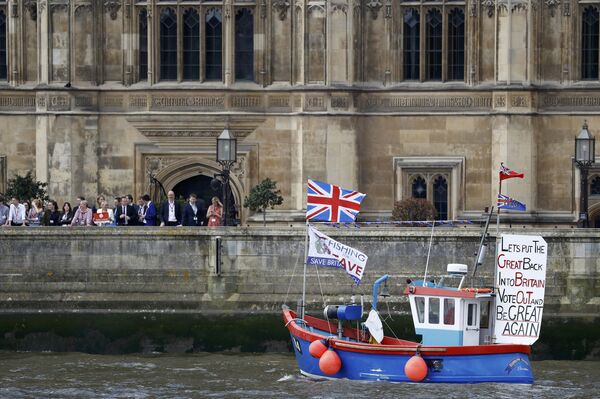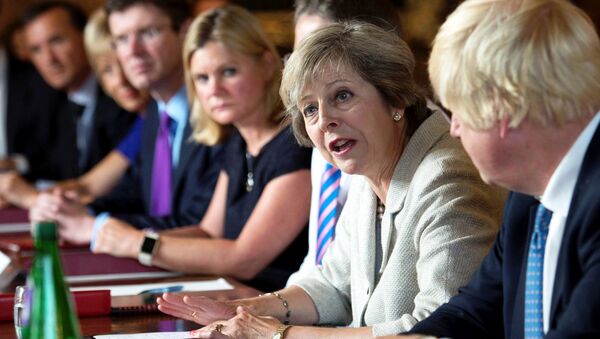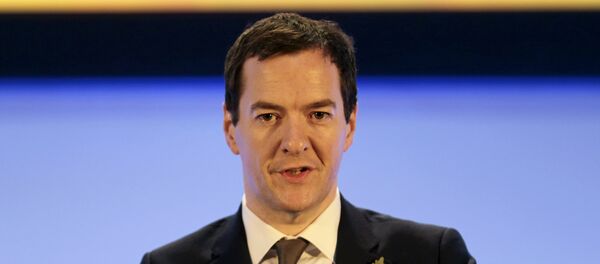May's cabinet was called to her country pile — Chequers, northwest of London, near Oxford — to report back on their first-pass wish lists as the reality of the complexity of negotiating Britain's exit from the EU came home to them.
The #Brexit process is a cat's cradle of complexity — will today's #Cabinet meeting gloss over that? https://t.co/vtRzpwsHKh
— Richard Corbett (@RCorbettMEP) 31 August 2016
The negotiations are being led by three people: David Davis, Secretary of State for Exiting the European Union; Boris Johnson, Foreign Secretary; and Liam Fox, Secretary of State for International Trade and President of the Board of Trade. However, May told the respective secretaries and ministers from across all departments to report back to her on their individual targets for Brexit.
Sources within Westminster have told Sputnik that the immediate conflict is between the Foreign Office, which prefers to remain as much a part of the EU as possible, and the Home Office, which wants to be tough on immigration and border controls, which were top of the public agenda ahead of the referendum on EU membership.

Immigration is going to be the major issue when negotiations eventually begin with Brussels. One of the central tenets of the EU is the freedom of movement of people, which German Chancellor Angela Merkel and French President Francois Hollande have made clear must continue to be at the heart of any trade agreement with the UK.
Although the UK is not part of the Schengen zone — the borderless EU area, which has been thrown into disarray by the migrant crisis — it still has obligations to allow for EU workers to travel and work in the UK. However, there has been a huge public outcry in Britain over EU migrant workers arriving, taking on lower wage jobs and being able to claim generous welfare handouts.
Any new deal with the EU over trade will almost certainly come with an obligatory requirement for Britain to accept EU migrant workers. Although the EU has a history of fudging issues, the UK may be able to negotiate a deal that says all incoming EU migrant workers must be able to support themselves and may be limited to taking jobs where there is a shortfall in the UK workforce.
Financial Freedom
The other major area of concern will be "passporting" in the financial sector, which is responsible for a major tranche of UK GDP. Under the provisions of the single market, a firm authorized in a European Economic Area (EEA) state is entitled to carry on permitted activities in any other EEA state by either exercising the right of establishment of a branch and/or agents, or providing cross-border services.
The EEA comprises all the 28 EU member states, plus Iceland, Liechtenstein and Norway. Switzerland is not in the EU or the EEA, but is part of the single market. Complicatedly, the passporting scheme does not apply to Jersey, Guernsey or the Isle of Man —all of which are tax havens.
In negotiating a deal to exit the European Union — the question is whether the remaining 27 countries will allow the UK to remain part of the passporting arrangement. If not, financial services companies that have their headquarters in London will be faced with the possible imposition of tariffs on their services throughout Europe. This would increase costs and reduce profits.
Fishy Problem
In the agriculture sector, most people believe the UK will opt out of the Common Agricultural Policy. EU farm subsidies currently make up to around 50-60% of UK farm income. The UK Government has guaranteed the current level of direct subsidies to 2020 "as part of the transition to new domestic arrangements."

However, on fishing, there is another issue. The UK will have to open negotiations over the exclusive national fishing rights over its Exclusive Economic Zone (EEZ) up to 200 miles from the coast. Then there will be the thorny matter of fish quotas — how much will UK fishermen be able to catch in their part of the North Sea, whilst keeping overall fish stocks sustainable? Back to the Cod Wars?
As May confers with her cabinet in Chequers, the realities of Brexit will dawn on each minister.
It will be a long haul trying to unpick all the details that have been agreed in the 43 years the UK has been an EU member.



